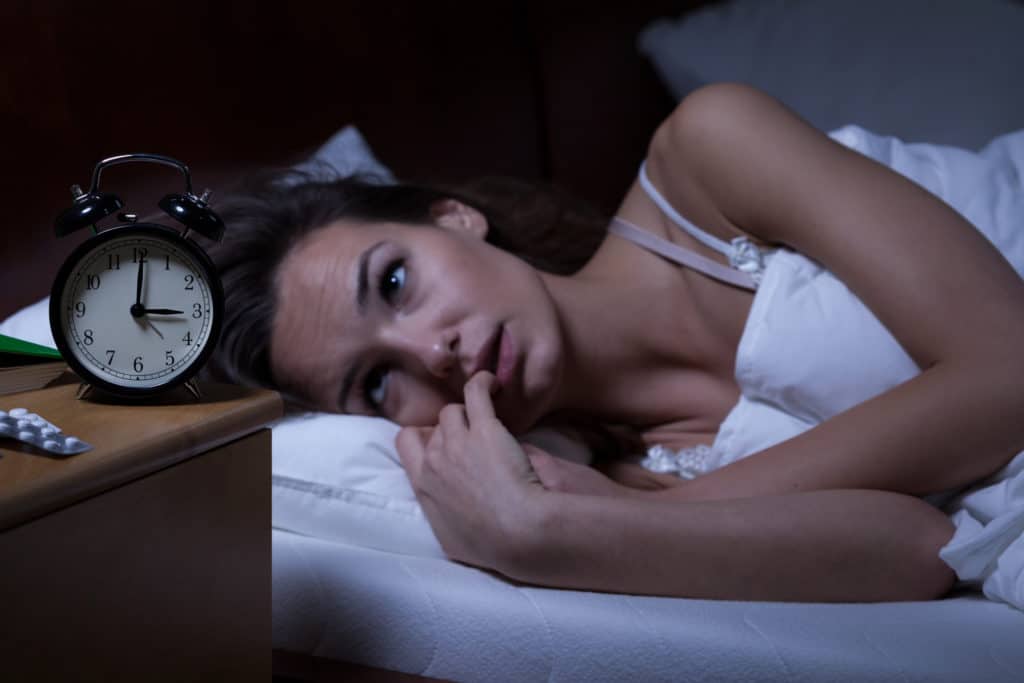You may never have had much of a problem with your sleep until now, or your sleep has suddenly got worse. Hormonal triggered sleep problems are very common at menopause, and insomnia is a massive pain in the arse!
Menopause and Insomnia – Hormones
Women can start having issues with their sleep long before they realise their changing hormones are causing it.
Typical patterns related to menopause:
- Waking up in the middle of the night – not easily getting back to sleep
- Difficultly going to sleep in the first place
- These are not necessarily caused by hot flushes, although they can be
Out of the two ‘female’ hormones progesterone levels tend to start falling first, as a women approaches menopause. Progesterone enables good sleep, without it women tend to struggle. At this point you might be having regular periods, or they might have changed slightly.
When your progesterone is falling your cycle starts to get a bit shorter than it used to be. It might not have crossed your mind that you’re perimenopausal at this point, and your sleep problems are resulting from it.
When progesterone to gets too low compared to oestrogen – this can trigger night sweats, which in itself will disturb sleep.
At some point your oestrogen levels sink too – and your sweats might get worse, or for you this may be the time they begin.
The stress hormones adrenalin and cortisol impact sleep too. Although not directly related to menopausal changes – they can end up getting unbalanced within the changing sea of hormones in your system.
If your diet and lifestyle choices haven’t been the best up until now, and menopause and insomnia is hitting you – improving your adrenal health will help with your menopausal symptoms. Find out more about Adrenal Fatigue here.
HRT?
Obviously once you’re menopausal your hormones are heading south. You can support your body with good diet and lifestyle choices, which can help, but they won’t restore your hormones to what they used to be.
HRT has had a lot of bad press in recent years – and quite rightly with how it was commonly prescribed. Things have changed though (in particular more access to natural HRT).
If you’re really struggling with your sleep it might be worth having a chat with a doctor who knows what’s what with HRT. Have you downloaded my free guide yet? It’s important to see someone who is educated about menopause and HRT.
Compounding Causes Of Insomnia
You may have a lot of bad habits that aren’t conducive to great sleep. Just because you’ve got away with it up until now – things have changed with your body now. You need to care for yourself a lot more now, if you want to feel your best.
I read somewhere that good preparation for sleep starts the moment you get out of bed! I for one am fully taking this on board these days.
That preparation includes:
- Getting natural daylight into your eyes in the morning to help set you sleep/wake cycle
- Getting up at a similar time every morning – this too helps set your cycle
- Cutting down caffeine, and having none after around noon
- Cutting back on alcohol because it disrupts the quality of sleep
- Taking exercise during the day
- Eating your last meal 2-3 hours before bed
- Dimming the lights in the evening and cutting out blue light – this allows melatonin to rise which helps you sleep
Combined Approach
Some women choose to replace the hormones they are now lacking. This is more than fine, there is no reason to ‘tough it out’, and there are longer term health benefits too (providing it’s done right).
There seems to be a lot of resistance to HRT, yet if you have an under-active thyroid you don’t think twice about replacing that hormone do you?
Probably the best help for menopause and insomnia is a combination of replacing low hormone levels, and health diet and lifestyle choices. Certainly if you chose HRT you’re only going to get the best out of it if your support your body at the same time.
Feel free to ask questions in the comments below, or to drop me a line.
Click here for the next Menopause Workshop
Have a great week!
Dr Julie
